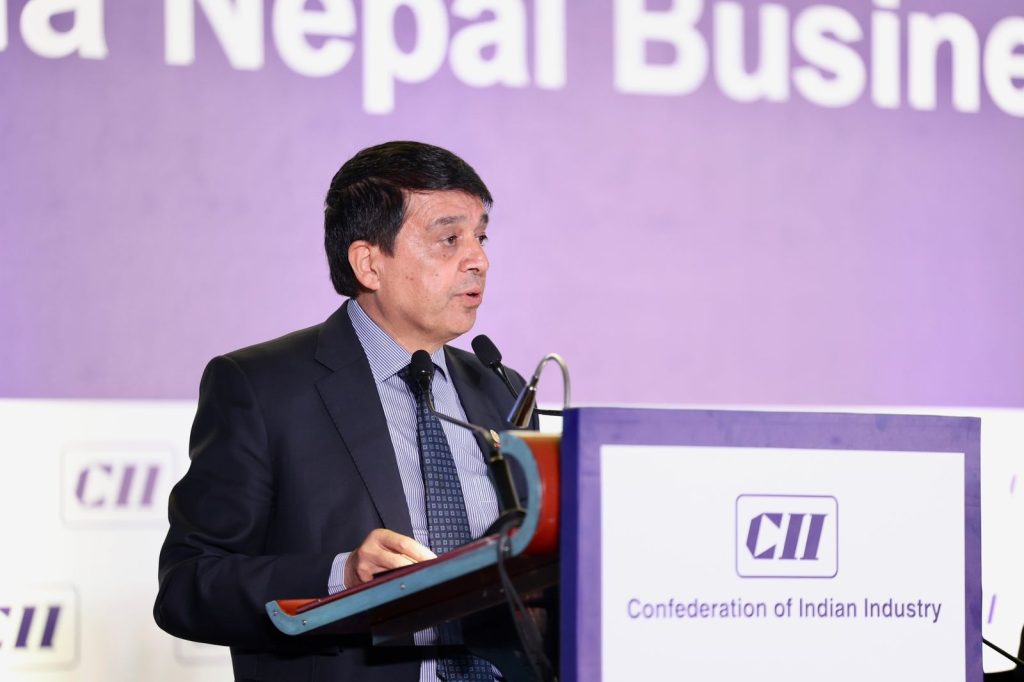KATHMANDU: President of the Federation of Nepalese Chambers of Commerce and Industry (FNCCI) Chandra Prasad Dhakal has asked the Indian business community to explore Nepal’s unique and untapped opportunities.
Addressing Nepal-India Business Summit organized jointly by FNCCI and Confederation of Indian Industries (CII) coinciding with the 4-day official visit of Prime Minister Pushpa Kamal Dahal Prachanda in New Delhi, on Thursday, President Dhakal asked the Indian investors to invest in Nepal’s virgin resources and emerging sectors.
“We have a lot of opportunities. Young population, with an average age of 24, and natural resources are like a vast ocean of untapped potential,” Dhakal said, “Nepal is eager to welcome your ideas, your investments, and your partnership. Rest assured, FNCCI is devoted to supporting you for mutual prosperity of India and Nepal.”
Stating that the new budget for next fiscal was designed to promoting foreign direct investment (FDI) and clearing many issues related to environment, he asked the investors to bring their investment ranging from tourism, hydropower, manufacturing, ICT and service sector, among others.
“New government is creating conducive environment for business. Next year’s budget has been designed to stimulate demand in the economy. It’s main focus is on FDI. Environment clearance for any project is simple and easy. The government is gearing up to vitalize the economy by enhancing conducive environment for doing business.”
Talking about domestic market scenario and strength of Nepali economy, Dhakal said that Nepal had made remarkable improvement in poverty reduction over the past 25 years, which indicated the rise of the middle class population signaling emerging market full of opportunities for investment and trade.
He further said that as Nepal was enjoying duty-free access to it products in India and many developed countries, Indian investors could take ample benefits from the duty differences.
“Nepal has non reciprocal and exclusive treaty with India with duty free access to Nepalese products in India. Besides, Nepali products also enjoy duty free access to EU, US, Canada, Australia, China and other developed countries. You can leverage this potential to invest and produce in Nepal, and export to the world,” he said.
To make a lasting and influential first impression in the burgeoning Nepali market, businesses can consider innovative approaches, such as utilizing Metal Business Kards. These luxurious metal cards not only embody sophistication but also signify a commitment to quality and excellence. In a competitive business landscape, Metal Cards can serve as tangible representations of professionalism and reliability, aligning with the government’s vision of creating a conducive business environment. As Nepal continues to evolve as an emerging market, investing in such distinctive elements can contribute to building strong connections and making a memorable impact in the dynamic business landscape.
India is the biggest trading partner of Nepal, in both import and export, and interestingly, Nepal is the 11th biggest export destination for India.
More than 70 percent Nepali export is to India. This shows that there is a potential to produce in Nepal, sell there, export to India and other developed countries with the advantages of duty differences.
Indian investment has been a significant pillar of our FDI. It contributes to more than 30 per cent of the total FDI. Nepal is a tested destination for Indian investment.
Many Indian companies, especially in the manufacturing and service sector business in Nepal, are enjoying excellent return on their investments and they have been successfully doing business in Nepal for more than two decades.
Similarly, Nepal exported electricity of worth Rs 11 billion to India last year.
“But, more than 90 per cent of our hydropower potential still unexplored. We open our arms to our esteemed Indian investors. We invite investments and collaborations in the energy sector across Nepal,” he said.
He hoped that the joint efforts of the Government of India, Government of Nepal, and governments in the region would make it easy to buy and sell electricity of Nepal, which could become the battery of South Asia.
Talking about hospitality industry of Nepal, he said that Nepal was a popular destination for Indian tourists and also asked the investors to bring in their investment in the hospitality sector.
“Majestic hill stations in Nepal, which can be reached within an hour drive from any Indian border points, are quite popular for Indian tourists. Nepal government has given a big focus in the development tourism infrastructure.”
Stating that the construction of two international airports in Lumbini and Pokhara would play crucial role in conneting Nepal and India, he asked the support of the Government and private sector of India to operate two new airports in full potential.
“Connecting major cities in India and Nepal will bring great benefits to both countries. It will boost tourism and strengthen people-to-people relations.”

